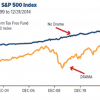Sorry, no content matched your criteria.
Featured Story
Investing in Mutual Funds: The Best Pick to Protect from Interest Rate Volatility

Right now investors should be investing in mutual funds that provide stability - not ones that chase yield.
A case can be made for the Fed doves who want to see rates stay low for a while, or the Fed hawks who want rate hikes now.
Right now investors should be investing in mutual funds that provide stability - not ones that chase yield.
A case can be made for the Fed doves who want to see rates stay low for a while, or the Fed hawks who want rate hikes now.
